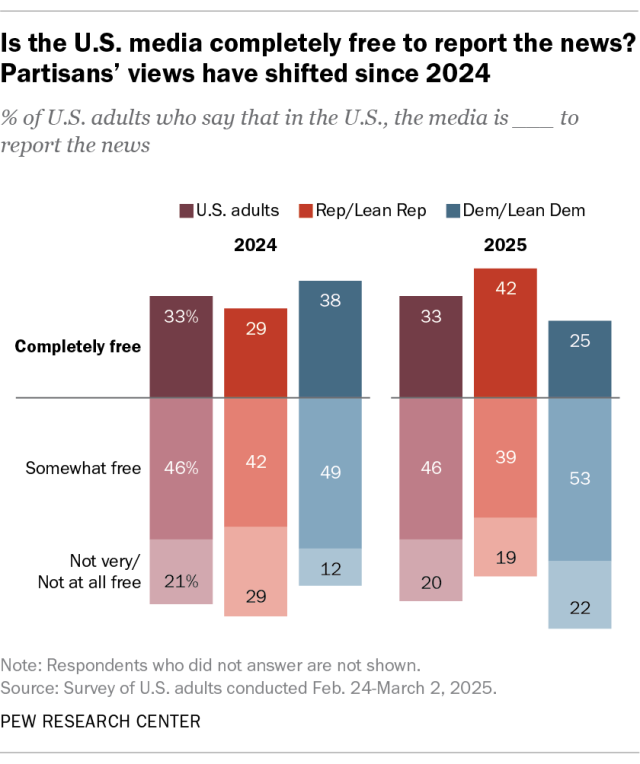☀️ Happy Thursday! The Briefing is your guide to the world of news and information. Sign up here!
In today’s email:
- Featured story: 60 Minutes producer resigns, citing loss of journalistic independence
- New from Pew Research Center: Americans remain concerned about press freedoms, but partisan views have flipped since 2024
- In other news: National Science Foundation cancels grants related to misinformation
- Looking ahead: The Washington Post, OpenAI sign content sharing deal
- Chart of the week: Most Americans say the U.S. news media is not completely free to report the news
🔥 Featured story
Bill Owens, the executive producer of 60 Minutes, announced this week that he would step down from the CBS news program, citing a loss of journalistic independence and telling staff that he is no longer allowed to run the show as he always has. This comes after President Donald Trump sued CBS last fall, claiming 60 Minutes deceptively edited an interview with former Vice President Kamala Harris, then the Democratic candidate for president. Paramount, the parent company of CBS News, has entered mediation with Trump in that suit.
Large majorities of Americans believe U.S. news organizations are at least somewhat influenced by government and political interests (86%) or by corporations and financial interests (85%), according to a new Pew Research Center analysis. The share of U.S. adults who say news organizations are influenced a great deal by government and political interests has risen from 49% last year to 57% today. Americans also have become slightly more likely to say corporations and financial interests are influencing news outlets a great deal (51% then vs. 55% now).
🚨 New from Pew Research Center
Most Americans continue to be concerned about potential restrictions on press freedoms in the U.S., according to a Center survey conducted Feb. 24-March 2. But there have been major shifts in partisan views since Trump retook office in January.
In 2024, during the Biden administration, 47% of Republicans and independents who lean Republican said they were extremely or very concerned about restrictions on press freedoms. Fewer Democrats and Democratic leaners (38%) said the same.
Under the new Trump administration, a majority of Democrats (60%) are highly concerned about press freedoms – about double the share of Republicans (28%).
Read more about Americans’ views on the state of press freedom in the U.S.
📌 In other news
- The National Science Foundation has canceled research grants related to misinformation and disinformation, citing a Trump executive order
- Sarah Palin loses defamation retrial against The New York Times
- Influencers on X saw their reach decline after feuding with Elon Musk
- A federal judge rules that Voice of America staffers can return to work
- Sewell Chan, the executive editor of Columbia Journalism Review, is fired after less than a year in the role
- A look at an international anti-corruption nonprofit news outlet in the wake of Trump’s foreign aid freeze
📅 Looking ahead
The Washington Post reached an agreement with OpenAI to allow ChatGPT to summarize, quote and link to articles from the Post in the chatbot’s responses. This deal is the most recent high-profile example of media outlets partnering with AI companies to allow their content to be used in AI products.
A recent Pew Research Center study found that both Americans and AI experts are generally pessimistic about the impact AI will have on the news people get in the next 20 years. About half or more of both experts (56%) and U.S. adults (51%) say AI it will negatively affect the news people get in the next two decades, compared with much smaller shares who say it will have a positive impact in this area (18% and 10%, respectively).
📊 Chart of the week
A majority of Americans say the U.S. news media is not completely free to report the news, according to a new Center survey conducted Feb. 24-March 2. Overall, a third of Americans say the media is completely free to report the news. The largest share (46%) say the media is somewhat free in this regard, while 21% say the media is not very or not at all free.
While these overall numbers are virtually unchanged since 2024, partisan views on this question have shifted in the past year. In 2024, Democrats were more likely than Republicans to say the media is completely free to report the news (38% vs. 29%). Today, Republicans are more likely to say this than Democrats (42% vs. 25%).

👋 That’s all for this week.
The Briefing is compiled by Pew Research Center staff, including Naomi Forman-Katz, Jacob Liedke, Christopher St. Aubin, Luxuan Wang and Emily Tomasik. It is edited by Michael Lipka and copy edited by Anna Jackson.
Do you like this newsletter? Email us at journalism@pewresearch.org or fill out this two-question survey to tell us what you think.